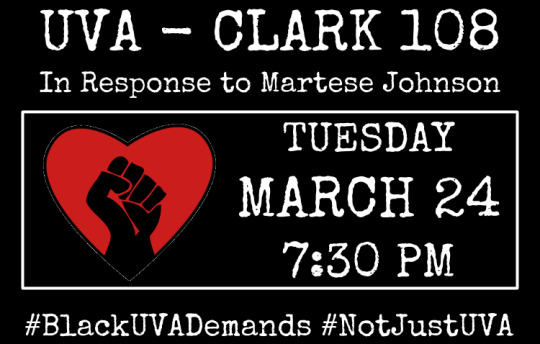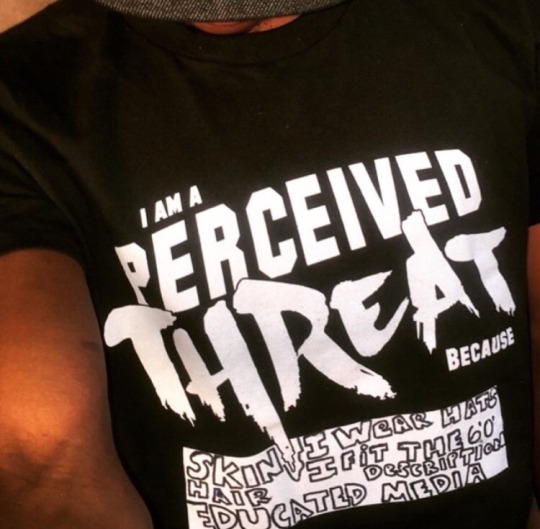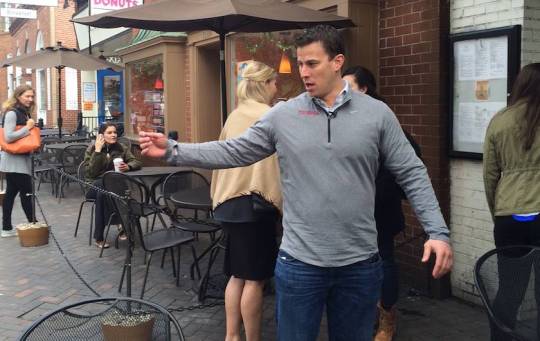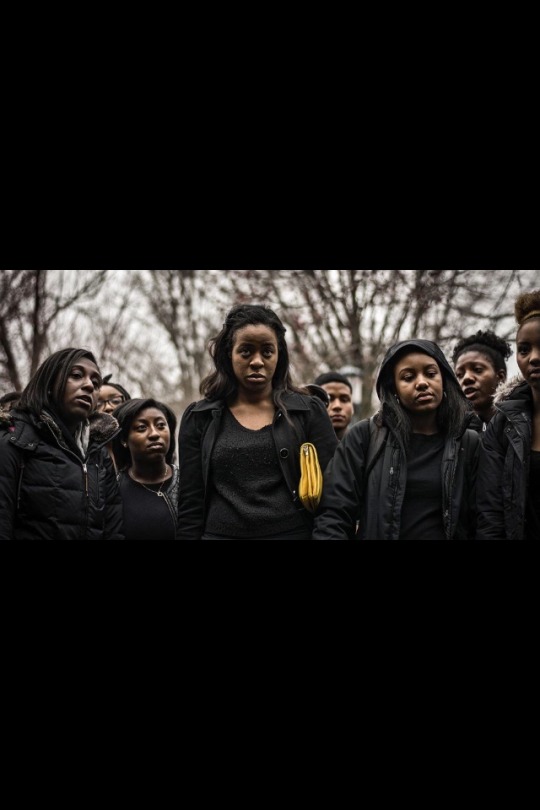#justiceformartese
Video
vine
Why do #BlackLivesMatter? Because of the evergrowing list of events happening to BLACKS #JusticeForMartese #MarteseJohnson #PoliceBrutality
0 notes
Video
vine
Why do #BlackLivesMatter? Because of the evergrowing list of events happening to BLACKS #JusticeForMartese #MarteseJohnson #PoliceBrutality
0 notes
Video
#Repost @prof_jenks with @repostapp. ・・・ #WeShallOvercome...some day. Listen as "We Shall Overcome" and J Cole's "Be Free" unite as one. Also listen to the chilling last words of Eric Garner speak over the strings...#TakeTheChainsOff #NewSpiritual #JusticeforMartese #ICantBreathe @primavocequartet @realcoleworld LINK TO FULL VIDEO IN MY BIO
0 notes
Video
youtube
On the evening of Wednesday, March 18, 2015 UVA students and Charlottesville residents held a forum and a direct action protest in reaction to the violent arrest of third year student Martese Johnson by ABC officers. Tensions were high during the direct action, with at least one individual being aggressively detained by Charlottesville Police Officers. After shutting down a number of intersections, demonstrators marched from the Corner down Main Street to the Friendship Court neighborhood, and then ended their march on the steps of the police station.
#martesejohnson#justiceformartese#uva#virginia#blacklivesmatter#hands up don't shoot#police brutality
0 notes
Text
Untitled Black
I sometimes liken my being
To that of the appleseed.
The Appleseed, black in nature
But surrounded by the oppressive white fruit.
And no matter how many apples you get, it's all the same.
But I was taught that with the faith of a mustard seed
I can not only succeed
But I can move mountains.
So with that I will NOT
SENSOR myself
To make you
Or anyone
Feel comfortable.
They tell me to say that
"All lives matter"
To make my white counterparts
Not feel left out..
What they don't understand is that
When I chant
"Black Lives Matter"
I have never been said that
All lives don't matter
And the fact that you must
Attempt to correct me
Means
That you
Do
Not
Truly
Understand!
It's okay if you don't understand.
I can't expect you to.
You'll never understand how it feels
To be black.
You'll never understand how it feels
To not be able to walk into a store or down the street wearing a hoodie.
Without fear for your life.
You'll never understand how it feels
To wake up not knowing if today will be the last day you see your friends and family because those that are supposed to protect you, are killing you and your race like flies.
You'll never understand how it feels
To be praised for your ability to bounce a ball,
Then in the same swift breath bounced of the sidewalk like your name is Spalding.
You'll never understand how it feels
To be called a nigger.
You can turn off your awareness at anytime
And continue to live within the scope of your white Privilege.
My race and I are not afforded that same opportunity.
We are constantly demonized and scrutinized by
The country that we built.
You'll never understand how it feels
To be me.
And I can't expect you to.
#notjustuva#uva#martesejohnson#justiceformartese#blacklivesmatter#alllivesmatter#spalding#basektball#poetry#spoken word#justice for martese#justice for trayvon#trayvon martin#mike brown
0 notes
Text
Unofficial #JusticeForMartese PSA RT, Reblog
(function(d, s, id) { var js, fjs = d.getElementsByTagName(s)[0]; if (d.getElementById(id)) return; js = d.createElement(s); js.id = id; js.src = "//connect.facebook.net/en_US/sdk.js#xfbml=1&version=v2.3"; fjs.parentNode.insertBefore(js, fjs);}(document, 'script', 'facebook-jssdk'));
Unofficial #JusticeForMartese PSA: At approx. 9 AM CST/10 AM EST, Martese Johnson will make his 1st court appearance....
Posted by Kelsey Riley on Wednesday, March 25, 2015
#JusticeForMartese#Justice For Martese#Justice4MarteseJohnson#Justice4Martese#BlackUVaDemands#NotJustUVa#NoMore#WhatWillBeEnough#MarteseJohnson#martese#martese johnson#Kenwood Academy High School#Kenwood Academy#Kenwood#KAHS#Kenwood Alumni#KenwoodAlumniUnited#BroncosUnited#Broncos United#police brutality#violence#respectability politics#safety#higher ed#higher education#University of Virginia#UniversityOfVirginia#Cville#UVa#BlackUva
0 notes
Video
Speaks volumes. #Repost @greekshenaniganstkap
・・・
This clip from "A Different World," definitely reflects the current times. Degrees and Education won't save you. #blacklivesmatter #JusticeForMarteseJohnson #JusticeForMartese #TKAP
0 notes
Photo


UVA - Clark 108
TUE MAR 24 - 7:30 PM
In Response to Martese Johnson
Co-sponsored with B.E.A.T.S.
We open this space for black cultural expression in community to express sentiments through song, dance and spoke work. Followed by a short discussion.
#UVA#VA#03.24#MarteseJohnson#JusticeforMartese#BlackLivesMatter#BlackUVADemands#NotJustUVA#NotJustSAE
27 notes
·
View notes
Text
Revolutionary Bodies
When you got the yams (What's the yams?)
The yam is the power that be
You can smell it when I'm walking down the street
(Oh yes we can, oh yes we can)
- Kendrick Lamar, King Kunta, To Pimp a Butterfly
Fight the power
We've got to fight the powers that be
- Public Enemy, Fight the Power, Fear of a Black Planet
What could Georg Büchner be evoking when he evokes in his 1879 posthumously-published play fragment, Woyzeck, a, “…good murder, a proper murder, a lovely murder, as lovely a murder as anyone could wish” (Büchner 2011, 138)? Good murder—a paradox if we take it, as Büchner suggests we should, not as a murder well executed but as a moral murder. Our question must be: by what norms could we call a murder good? And, supplementary aporia, are they contra ours, or are they, as Büchner suggests when he puts the words above in the mouth of a town, those deviant parts of ourselves valorized by discourses about human and animal, about rationality and irrationality? In hospitals, in schools, in jails, and in barracks (with thanks to the Michel Foucault of Discipline and Punish for his categories), we see evidence for the latter interpretation.
Woyzeck’s of his partner Marie is the “good murder” of which the townspeople speak. Though Woyzeck is a fragment, its scenes in disorder, most reconstructions of the play have Woyzeck, Büchner’s protagonist, discovering Marie’s infidelity with a virile drum major before stabbing her outside town. Woyzeck’s motivations are clear prima facie, but muddle when we question ask how he came to view murder as permissible. The Woyzeck whom we meet at the play’s inception is no jealous lover given to crimes of passion—Büchner singles out that Woyzeck as a soldier and an exceptionally good provider for his station (Büchner 2011, 118). Woyzeck was not born a murderer, but made so, and his eponymous play tracks this progression.
I see at least four processes instrumental to the formation of Woyzeck the murderer; the first is a process of tabling, of prescribing social relations on the basis of a hierarchical order. Büchner subjugates Woyzeck early in his play; whereas the Woyzeck at the play’s inception is merely the protagonist, we learn that he is also a soldier of the servile class as he shaves his Officer (Büchner 2011, 118-120). Though Woyzeck takes on supererogatory duties in order to support his wife and child, the Officer, in a lengthy monologue, deems him immoral due to his station. Morality for the Officer is not a matter of doing the right thing, but of exercising power. He must virtuous because he commands Woyzeck; Woyzeck must be deviant because he is commanded. This is a morality that valorizes and perpetuates inequality.
Woyzeck’s obligations are in that way turned against him—if he is to support his family, he must subjugate himself and, in so doing, give up the framework of duty that first motivated him. Woyzeck accepts his station: “…us common folk, we don’t have no virtue, all we got is our nature; but if I was a gent with an ‘at and a watch and a nice smart coat and could talk all posh, I’d be virtuous alright” (Ibid). He accepts, in other words, that his actions are intrinsically evil, as he is always already a sinner qua enlisted man. The mechanism of rank creates a man who is good—a good enlisted man—insofar as he is evil.
It is not enough for Woyzeck to pledge allegiance to this perverted morality; he must be trained in it. This training regimen, a prescription of movement, is another process instrumental to the creation of a murderer. The Doctor, who pays Woyzeck for the use of his body in medical experiments, trains Woyzeck several times throughout the play. Notably, he berates Woyzeck when the latter urinates in the street: “You pissed in the street, against the well like a dog. And two groschen every day! It’s bad, Woyzeck, the world’s turning very, very bad” (Büchner 2011, 121). It is not that some of Woyzeck’s actions are wrong and that he must be trained toward the right, but rather that he must be trained to hate himself. When Woyzeck later wiggles his ears at the Doctor’s request, he is berated just as harshly as when he deviates from the man’s expectations (Büchner 2011, 127). He is, once again, called “animal” (Ibid). Distrusting his own way of being in the world, Woyzeck is made ready to perform all and only those actions suited to a servant.
Woyzeck, convinced that his every motion must be toward an evil end, is much more likely to accept commands from the powerful. These exercises, to be understood both as “training regimen” and “of power,” are the only motive possibilities open to his rank. To the Doctor, Woyzeck is a medical experiment whose value lies in the degradation of his body due to his prescribed diet of peas. To the Officer, Woyzeck is a tool that shaves and entertains in his capacity as a sycophant. Though these ritualized acts—dieting and serving—harm Woyzeck, he performs them when commanded to do so, as a good soldier must.
We should not, therefore, read Woyzeck’s broken body as agential, but rather as the conduit through which power perpetuates itself. It does so by means of murder—Woyzeck’s of Marie. We have seen how Woyzeck begins to value the signs of power over those about whom he cares in the course of his subjugation, and we have also seen how arbitrary those signs are. Woyzeck, with rough style and speech, shows greater care for his loved ones than his commanders show him (where are the Doctor’s and Officer’s beloveds?). Woyzeck is not transmuted from a basic animal into a rational man at the hands of his superiors, but instead re-made in their image. “I only went to war to boost my love of life” (Büchner 2011, 125)! The Officer sees in himself the very brutal animal from whom he claims to save Woyzeck. Woyzeck murders Marie because those controlling him are themselves murderers.
In his 1975 work Discipline and Punish, Michel Foucault calls this tendency that “gets troops to fight” tactics. Just as his superiors produced the Woyzeck who killed the woman for whom he cared, so too are tactics a catharsis, appearing as a valorization of the violence and lack of care that prefigure unequal power relations (Foucault 1977, 168). Foucault sees tactics at work in a multiplicity of disciplinary spaces. In the hospital, he sees the hierarchy of public health, wherein what is healthy equates with that is most productive. Those who do not integrate into a productive society are deemed mentally ill, unfit to control their own bodies. In the prison, similar logic—the prisoner is a criminal, intrinsically evil, beyond salvation. We see tactics in the classroom, where the examination causes students to view one another with a suspicion born of competition that hampers their ability to learn from one another. We see them in the barracks, where soldiers like Woyzeck find their bodies turned to grand campaigns of violence. Tactics show us the horror of these figures: we expel them as pathogens from our socio-political body at our peril, for that which is hateful in them, which differentiates “them” from “us,” is of our creation. Tactics is the system by which we reproduce evil.
Tactics also offers hope. As it turns caring bodies against their communities, it shows the underlying bonds that must be broken before inequality can perpetuate. Take the case of Martese Johnson, a student of color at the University of Virginia who, accused of possessing false identification, was stopped, questioned, and beaten by the police on St. Patrick’s Day, 2015. The Martese whom we meet in news media is a “polite, cordial” honors student “with a bright future” (McClam, Winter, CNN 2015). Martese’s story is not newsworthy because a black body faced police violence. That, unfortunately, happens regularly. Martese, an honors student, instead shows through the hollowness of the norms that legislated brutality. We saw in Woyzeck how the inequality that lead Woyzeck to subjugation offered no route to salvation. We see in Martese’s case that even the trappings of respectability could not save him.
In both cases, however, tactical norms were neither the first nor the last word in our explorations of who was wronged and what we owe them. Our bodies are never docile—they are always already caring, always already revolutionary. Woyzeck could not have been subjugated had he not existed before entering into a power relationship; he would not have subjugated himself so had he not needed funds for his family. Martese’s case also shows us that though our trained exercises in unequal spaces cannot protect us from the violence inherent to those spaces, we can still think its horror. The care of news media exhausts itself at the basic unacceptability of police brutality toward any body. We can see that it should not, and that we need radically new categories of care if we are to avoid violence of this sort. “Good murder” was a senseless category in Woyzeck. It remains senseless today.
Bibliography
Büchner, Georg. Woyzeck. San Francisco: Exit Press, 2011.
"Black UVA Student Bloodied during Arrest; Governor Demands Investigation - CNN.com." CNN. Accessed March 22, 2015.
Foucault, Michel. Discipline and Punish: The Birth of the Prison. New York: Pantheon Books, 1977.
"Martese Johnson Was 'Polite and Cordial' Before Arrest, Bar Says." NBC News. Accessed March 22, 2015.
Winter, Michael. "U.Va. Bar: Black Student Denied Entry Not 'belligerent'" USA Today. March 22, 2015. Accessed March 22, 2015.
4 notes
·
View notes
Photo

#iamaperceivedthreat because of my skin, I wear hats, I'm educated, I fit the 6 foot black male description, and the media. Grab your shirt, tell your story and support #perceivedthreat campaign. Link in bio.
2 notes
·
View notes
Text
it’s so weird to constantly see Martese’s face to appear on tumblr in posts with 50000+ notes, this is shit can happen to anyone and at any time. Family and friends aren’t excluded. smh.
6 notes
·
View notes
Photo


UVA bar releases official statement about Martese Johnson beating
On Saturday, Kevin Badke, the 35-year-old co-owner and manager of Trinity Irish Pub, explained in his statement and invite-only press conference that he had personally checked "about 30" ID cards at the door that night. When Johnson could not remember the zip code on his Illinois driver's license, Badke said, he determined it was likely "fake" and turned him away, Inside Charlottesville reports.
His report still raises serious questions.
330 notes
·
View notes
Photo

Everytime a black man falls, a black woman rises and takes a stand. Black women in the front lines fighting for justice at UVA.
332 notes
·
View notes